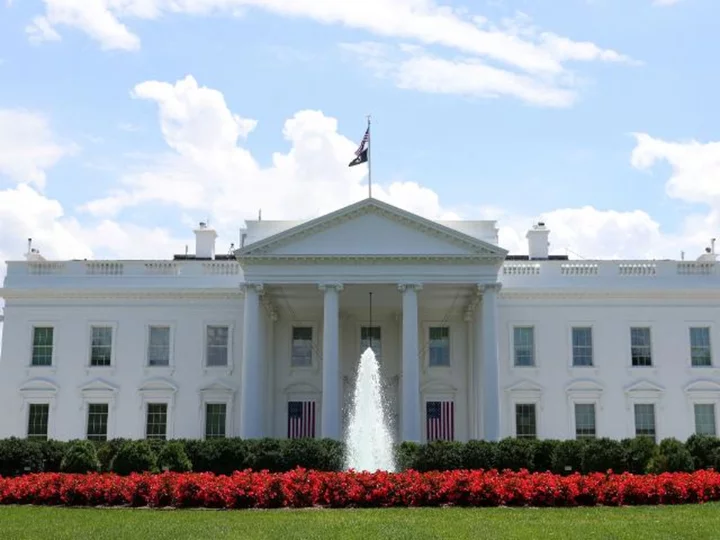
Secret Service investigation into cocaine found at White House expected to conclude next week
The Secret Service is expected to conclude its investigation into a bag of cocaine found in the West Wing early next week, a federal law enforcement official told CNN -- regardless of whether a suspect is identified.
2023-07-07 06:51
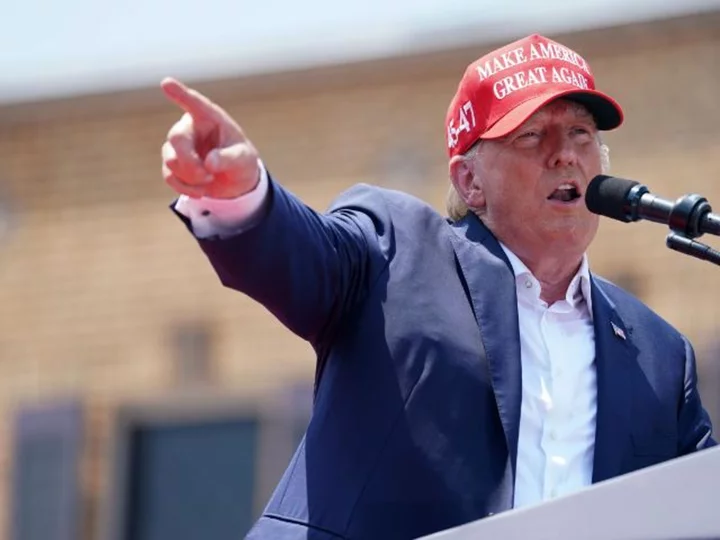
Judge rules Trump can be deposed in lawsuit from ex-FBI agent Peter Strzok
A federal judge ruled Thursday that Donald Trump can be deposed in the lawsuit ex-FBI agent Peter Strzok brought against the Justice Department for his wrongful termination after the Russia investigation.
2023-07-07 06:49
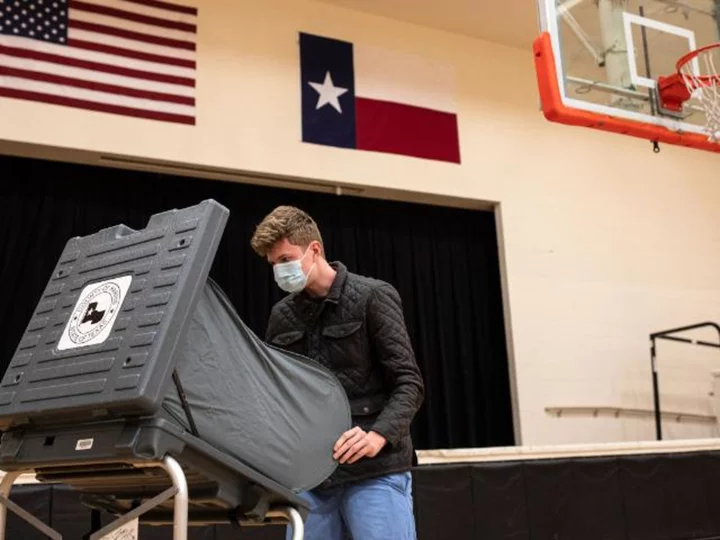
Houston-area county sues Texas over law that eliminates its elections administrator position
Texas' most populous county -- Harris County, which is home to Houston -- has filed a lawsuit against state officials challenging the constitutionality of a new law that eliminates the position of local elections administrator, Harris County Attorney Christian Menefee announced Thursday.
2023-07-07 05:54
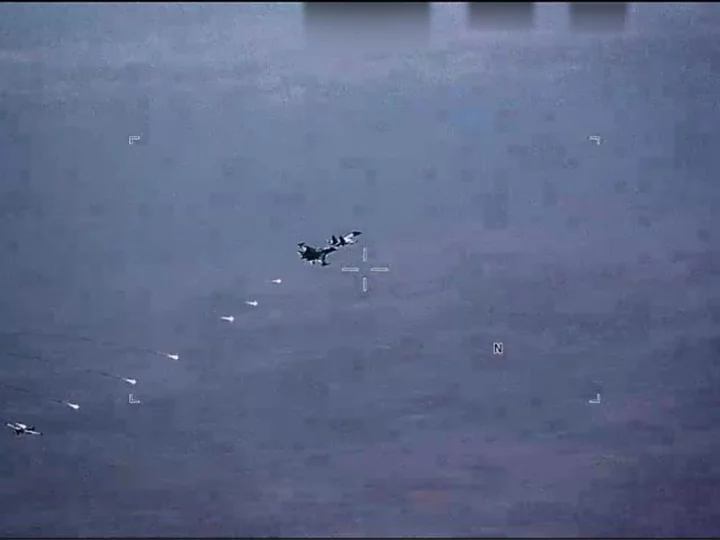
Russian fighter jets harass American drone over Syria for second time in two days, US Air Force says
Russian fighter jets harassed an American drone operating over Syria for the second time in two days, according to the US Air Force, a sign of increasing friction between the two countries in Middle East airspace.
2023-07-07 05:48
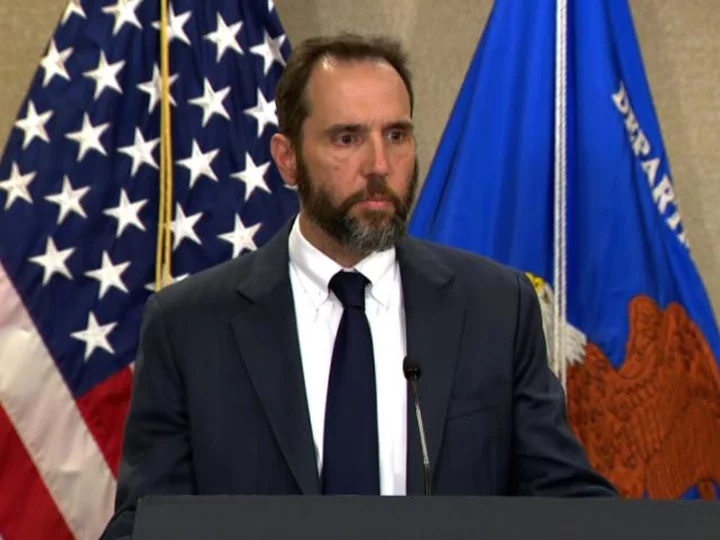
Arizona secretary of state's office subpoenaed in special counsel probe into 2020 election interference
Special counsel Jack Smith issued a subpoena to the Arizona secretary of state's office in May as part of the ongoing criminal probe related to efforts to overturn the 2020 election, CNN has confirmed.
2023-07-07 05:17
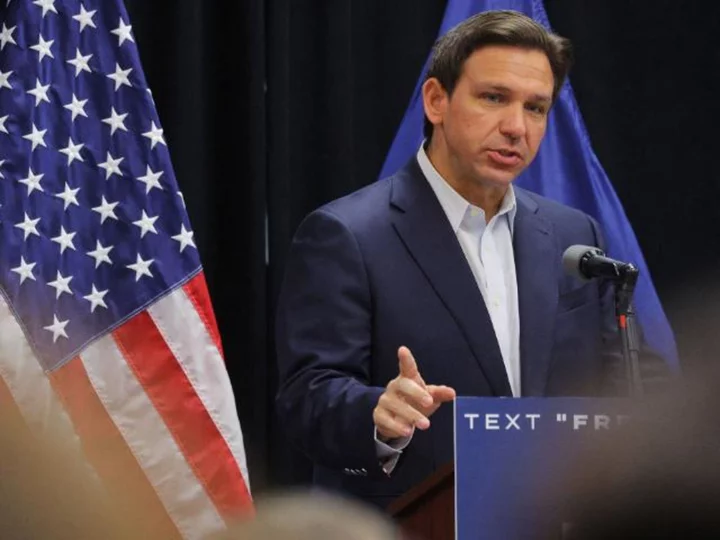
DeSantis raised $20 million in second quarter, campaign says
Florida Gov. Ron DeSantis's presidential campaign raised $20 million during the second fundraising quarter that ended June 30, the campaign announced Thursday.
2023-07-07 04:56
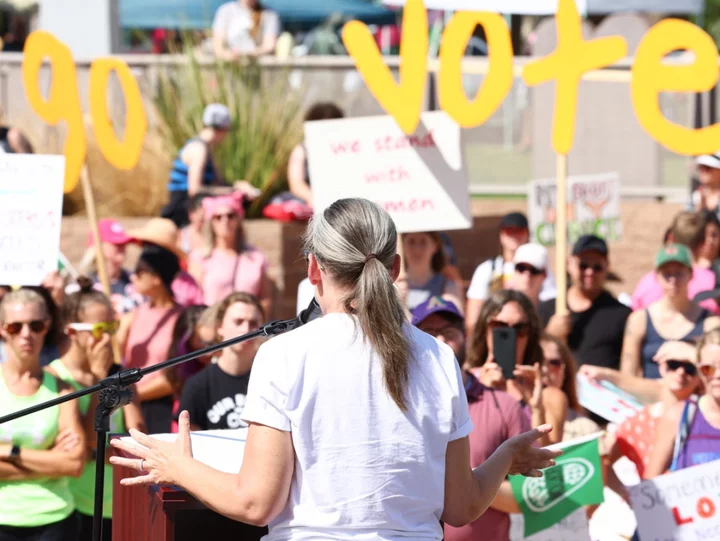
Turnout spiked among younger voters in the last three elections. This is what’s needed for that to be repeated in 2024
Long thought to have given up on politics and given in to apathy, the political activity of younger people is now surging. In 2018, the first election since former President Donald Trump’s 2016 win, turnout spiked among younger voters, with almost double the number of those in their late 20s and early 30s taking part compared to the previous midterms in 2014. Younger voters strongly supported the Democratic Party, helping them take back the House in 2018 and the Senate after the Georgia runoffs in early 2021, but it was unclear if the spike in participation would carry on after Mr Trump left the White House in January 2021. Taking into account the 2022 midterms where Democrats held onto the Senate and lost the House by a smaller margin than expected, the progressive research firm Catalist states in a report that “Gen Z and Millennial voters had exceptional levels of turnout, with young voters in heavily contested states exceeding their 2018 turnout by 6% among those who were eligible in both elections”. Similarly, the Center for Information & Research on Civic Learning and Engagement (CIRCLE) at Tufts University released an analysis shortly after the 2022 midterms stating that “young voters in Arizona, Nevada, Georgia, Wisconsin, and Pennsylvania gave Democratic candidates a winning advantage in close races”. In Arizona, Democrat Katie Hobbs beat Republican Kari Lake by 17,117 votes in the governor’s race. “Young people provided a net of 60,000 votes toward” Ms Hobbs, handing her the win, according to CIRCLE. In the Nevada senate race, young voters backed Democrat Catherine Cortez-Masto at a rate of three times her margin of victory. In the Georgia senate race, younger voters gave Democratic Senator Raphael Warnock 116,000 net votes against Republican nominee Herschel Walker in 2022. Rev Warnock received just 35,000 more votes in a race that moved ahead to a runoff where the Democrat retained his seat. In Pennsylvania, Democratic Senator John Fetterman beat Mehmet Oz by about 190,000 votes with young voters providing him with a net 120,000. Wisconsin Governor Tony Evers won re-election by 89,000 votes as young voters cast a net 79,000 ballots in his column. “In close elections decided by just a few percentage points, young voters can be more than influential: because of their often vastly different vote choice compared to older voters, they can be decisive,” CIRLE writes. The lead author of that study, CIRCLE elections coordinator Ruby Belle Booth, tells The Independent that “we’ve been seeing over these last three cycles a new generation that’s really finding its political voice. “And if you think about when their civic development has been happening, they’ve had access to smartphones and the internet and social media that’s given them both unprecedented access to information and also connecting them with one another.” But she goes on to note that these voters have become adults in an age of extreme partisanship and political strife – often involving issues that are important to them such as the climate crisis and gun violence. “Our research shows that they really see the power in their own voice,” Ms Booth says. Catalist found that “65% of voters between the ages of 18 and 29 supported Democrats, cementing their role as a key part of a winning coalition for the party”. “While young voters were historically evenly split between the parties, they are increasingly voting for Democrats. Many young voters who showed up in 2018 and 2020 to elect Democrats continued to do the same in 2022,” the research company added. According to the US election project operated by political scientist Michael McDonald at the University of Florida, 111 million votes were cast in 2022 compared to 118 million in the previous midterms in 2018. “In the last few elections, in particular, I think there have been these issues that have really been motivating young people and getting them to the ballot box more so than … particular candidates or the influence of political parties,” Ms Booth says. This “issue engagement” and organising spearheaded by young people has helped increase turnout among younger voters, she adds. Speaking about the 2018 midterms, Ms Booth mentions the Parkland school shooting, saying that gun control was a “major motivating force”. “Young people who said that they supported or were actively involved in the post-Parkland movement were 21 percentage points more likely to say they voted, which I think just goes to show that connection between issues and organizing and turnout,” she says. “In 2022, I think that issues, again, like gun control and abortion and climate and student loan debt brought people out to the polls.” “It’s not just that young people care about gun violence and gun control – it’s that there have been these youth-led movements to get young people to connect those issues to elections and to voting,” she adds. CIRCLE found after the 2022 midterms that “Young voters are more likely to trust elections and feel democracy is secure, as well as to identify as independents”. Optimism about the future is also higher among younger voters compared to their older counterparts. “In 2022, one of the big pushes, especially with ... older Democratic voters ... was that this is a chance to save democracy because there are all these candidates who are … threatening democracy. And I think that that isn’t necessarily something that young people really connect to because they haven’t necessarily seen democracy functioning super well historically because of this partisanship and not seeing action on the issues that matter to them,” Ms Booth says. She adds that younger voters are less likely to be swept up in the culture war and in partisan arguments because they “just want things to get done that will provide them with a healthier, healthier, happier, better life”. When asked if younger voters are motivated to go to the polls more by fear and anger rather than optimism, Ms Booth notes that following the 2018 election, CIRCLE found that young people who were more cynical about politics were more likely to vote. “But I don’t think that necessarily means that everyone is going to the polls from a place of total cynicism,” she says, adding that seeing political accomplishments that further their interests means they’re “going to be coming to the polls with a bit more optimism and hope”. “There’s going to be times when they’re enraged and want to make sure that their rights are being protected. I think it is really circumstantial, and I’m not sure that we have the data to answer which is more motivating because I think it will depend on every young person and the state that they’re in and the political dynamics that that they’re going through,” she adds. A CIRCLE survey released earlier this year found that 55 per cent of people between 18 and 29 believed that the country is moving in the wrong direction while only 16 per cent believe it’s on the right track. Twenty-eight per cent were unsure. Asked if millennials are bucking the trend of voters growing more conservative with age, Ms Booth says: “The one thing I always come back to when talking about that sort of trend … is that the lives that millennials are leading now are really different from the ones … that boomers were when they were the same age”. She adds that a number of the “milestones” that are seen as being a part of becoming more conservative, such as getting married or buying a house, “millennials relate to differently because they have a different relationship to the institution of marriage”. “They also have a really different economic situation and it’s going to be a lot longer before most millennials are able to buy a house,” she says. “I’m not sure if that is actually impacting how they’re experiencing their political beliefs but I think it’s hard to ignore the fact that there are these very real differences. “I’m not surprised that we would see that bear out in their political leanings as well.” She sees that trend continue with Gen Z. “Millennials were more diverse, more progressive, and in some ways more engaged than Gen X when they were young. And I think we’re seeing that now” with Gen Z. Members of Gen Z were first able to vote in the 2018 election, “and we did see that huge bump. Whether that was all Gen Z is impossible to say,” she says, adding that younger voters are making the electorate trend more liberal and more engaged. “But it’s hard to say if that’s an overt difference between Millennials and Gen Z or if … they’re just new young people in the fray,” she notes. While the political activity of younger voters is on the rise, older voters still have them beat in terms of turnout. According to the Brookings Institution, in the 2022 midterms, “18- to 29-year-olds showed a noticeable decline in turnout since 2018, with the oldest group (over age 65) registering a modest gain”. In the 2018 and 2022 midterms, more than 30 per cent of 18-29 year-olds voted, compared to around 20 per cent in the 2014 midterms. Among those 65 and above, more than 60 per cent voted in both 2018 and 2022. Brookings noted that “as in the past, older eligible voters displayed higher turnout rates overall than younger eligible voters”. Ms Booth says that “There’s a lot of barriers to voting that young people face that older people don’t … things like policies that get rid of early voting and policies that limit mail-in voting and policies that make it harder to register to vote”. Younger voters are “more likely to move around a lot … which can make it harder to update your registration and to follow the different local rules about voting and elections”. “I think a lot of older adults are like, ‘Oh, voting is easy’ – Yeah, it’s easy if you’ve done it a million times,” she adds. “But if you’ve never registered to vote before, you don’t know what a county clerk is, it can be not only challenging to find that information but also really intimidating.” A CIRCLE analysis from earlier this year states that just “half of youth say they’re ‘as well-informed as most people’ and only 40 per cent say they feel well-qualified to participate in politics”. “I think that young people don’t want to make uninformed votes and they definitely desire more information,” Ms Booth says. “I think there’s a tendency to be like, ‘Oh, well, young people don’t vote because they don’t care’ – But I think it’s a lot more likely that it’s because they are facing these barriers, whether it’s because they just literally don’t know how to register because nobody’s ever told them or they don’t think their vote or their voice matters because no one’s ever told them it does,” she adds. Ms Booth said there’s an “opportunity between now and 2024, to make sure that every single young person has the information and resources they need to get registered to vote and to cast their ballot. “It’s also about building this confidence and building this self-assuredness and sense of self-efficacy – there are over eight million young people who are going to turn 18 between 2022 and 2024. And I think that they really represent this opportunity to get young people engaged. “They’ve never done this before. It’s going to be their first presidential election … So we can either have a huge investment in making sure that those young people get the information they need, or we can fail to invest and they won’t be given the tools and information they need to turn out.” “If that happens with 18,19 year-olds, and with 18-29 year-olds who are still building that habit of voting, I think you’re going to be a lot more likely to see that young people don’t turn out as much in 2024,” she cautions. “If we’re showing up for young people between now and 2024, then young people will likely show up at the ballot box and once again prove to be this really influential force but they’re not just going to do it without the support and the organizing that’s been happening for the last six years.” “Young people have this tendency to really be focused on issues ... and less on the broader political landscape … but if Trump is on the ballot in 2024, I think that will be a different story,” she notes. Ms Booth says that the issues young voters tend to care about are “closely intertwined with their lives and their identities” mentioning the movement for racial justice in 2020 and the struggle for reproductive rights in the wake of the Supreme Court striking down Roe v Wade. “I think for young women, it’s easy to feel like your very self-hood is under attack when that’s being threatened and for other young people who may see the restrictions on abortion as a win because there’s also plenty of anti-abortion young people – they’re seeing their religious beliefs or moral beliefs really tied up in these political issues,” she adds. The elections coordinator says the internet and social media shouldn’t be relied upon as the “main place that young people get their information because some people’s TikTok feeds are going to be all politics and other people’s are going to have no politics, and that’s just how these algorithms work”. This is why it’s important for other groups and institutions to step up to “serve as a political home” for younger voters, she adds. “Some young people live in families and communities where everyone’s talking about politics and others live in communities where no one’s talking about politics. So there are a lot of different factors that can be feeding into if people are actually informed or not. I think it’s not a given that just because the information exists on the internet they’re going to necessarily know to even look for it. “The young people who didn’t vote in 2022 – 38 per cent said they forgot or were too busy, which can be solved with more information – more people telling them when the election is, or with policies that provide opportunities for things like early voting and absentee voting,” she notes. “Thirty-two per cent said they didn’t think it mattered or it wasn’t important to them … I think we can we can fix that with information as well.” “When you’re looking at a midterm election … there are also all these local elections that can be really confusing and hard to understand like what even is a lieutenant governor – I think a lot of young people haven’t learned about that in their schooling,” Ms Booth adds. She notes that the “information ecosystem” gets more challenging as you move towards more and more local issues. “I think about my local news, so much of it is behind a paywall that if I’m a young person, I’m not going to know who’s running for city council,” she says. “Some young people, they’re going to hear about voting and registering to vote in school and they’re going to jump at the opportunity, other young people … they’re going to be less likely to vote because they hate school. “So it’s really important that they have multiple places where they’re hearing about voting and elections, to help to start to build that self-efficacy and that feeling like they actually are qualified,” she adds. Asked if 2024 ends up being a Trump v Biden rematch will lead to a spike in young voter turnout, Ms Booth says, “I think about this every day – I have no idea”. “I think the difference is going to be made if these political leaders are speaking to young people and talking about the issues that matter to them and bringing them on as staffers on their campaigns and having outreach not only to the young people who are easy to access, like the young people on college campuses – but going beyond that and making sure that every young person, whether they’re in college or not, no matter their background, no matter where in the country they are, that they’re being spoken to and being heard,” she says. “I think it’s so hard to play this prediction game because when it comes to young people, it really depends on what a lot of other people are doing. “Traditionally, we see that the Democratic Party and Democratic campaigns do a better job of reaching a diversity of young people … but that doesn’t mean that that can’t change. And it doesn’t actually reflect what’s happened so far this election cycle.” Read More Florida will make Republican candidates sign loyalty pledge to support eventual nominee Trump adviser brands VP-hopeful Kari Lake a ‘shameless, ruthless demagogue’ DeSantis doubles down on ‘homophobic’ anti-Trump ad: ‘Totally fair game’ Wisconsin governor seals 400 years of public school funding increases with budget veto Democratic council member joins race for Indiana's open US Senate seat Florida will make Republican candidates sign loyalty pledge to support eventual nominee
2023-07-07 03:54
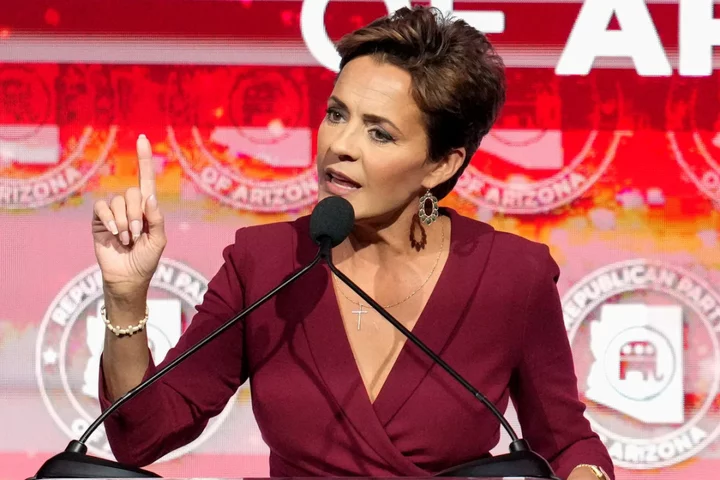
Trump adviser brands VP-hopeful Kari Lake a ‘shameless, ruthless demagogue’
Just days after failed Arizona gubernatorial candidate Kari Lake said she was considering a Senate run, Donald Trump’s advisers revealed that the former president has become disenchanted with her in recent months. Ms Lake announced on Saturday that she was weighing a Senate run, despite repeatedly losing legal challenges to her election loss. “Politics is gross. It’s a slimy business, but I think we need real people to be in it. And so I am contemplating running for office again,” she told Breitbart. According to The Daily Beast, the former president specifically found Ms Lake’s attempts to get attention distasteful. “She’s a shameless, ruthless demagogue who wants power and will do whatever she has to do to get it,” a Trump adviser told the publication. Ms Lake has tried to position herself as a potential contender to become Mr Trump’s pick for vice president—a tactic the former president also apparently did not appreciate. The former president doesn’t like how Ms Lake is “running around saying she should be VP,” an adviser told the outlet. “Tells you all you need to know that he did not make her his national spokeswoman,” they added. “She was an obvious choice.” Another adviser told The Daily Beast that the former president “sees through her gambit for the vice presidency.” An operative close to the Trump campaign also chimed in, telling the outlet: “I think she is an effective surrogate, but I’m not sure she will be a VP pick,” also suggesting that the Arizona Republican could serve as the former president’s press secretary if elected again. Despite the criticisms coming from Mr Trump’s orbit, a spokesperson for Ms Lake told the publication that the rumors were “pathetic attempts from Team DeSantis.” “MAGA world is more United [sic] than ever and ready to win big in 2024,” the spokesperson said. In June, reports emerged that the Arizona Republican was “couch-surfing” at Mr Trump’s Mar-a-Lago home. “Kari Lake is there all the time,” a source told PEOPLE Magazine. “There’s a suite there that she practically lives in.” Ms Lake’s adviser responded to the news, telling The Independent: “This is a ridiculous story from a gossip tabloid that frankly we thought went out of business in the early 2000’s. Kari Lake often speaks at events all over the country in support of America First candidates and organizations; and when she does have the honor of being invited to speak at the beautiful Mar-a-Lago, she overnights at Hilton properties in Palm Beach with her loving husband of 25 years.” Read More Arizona election denier Kari Lake ‘couch-surfing like a bum’ at Mar-a-Lago, ex-Trump lawyer says Arizona Republican election official sues Kari Lake for defamation ‘This will escalate’: Kari Lake called out over incendiary threat to Biden admin after Trump indictment
2023-07-06 23:55
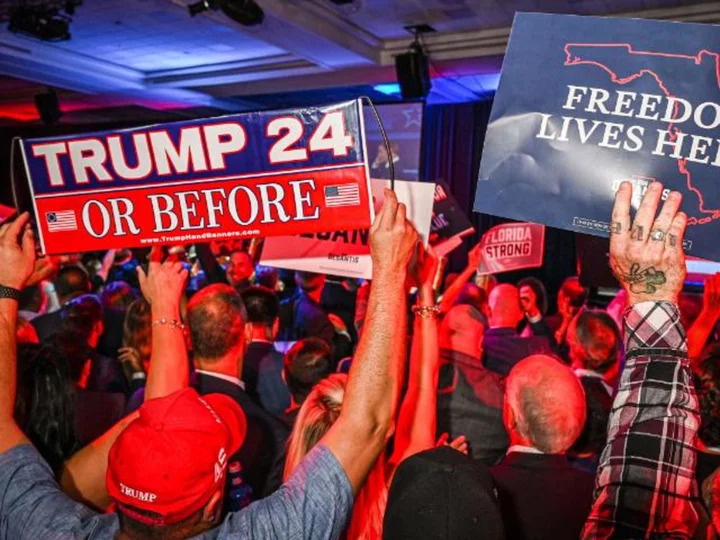
Florida GOP will require 2024 candidates to sign loyalty pledge to qualify for primary ballot
Florida Republicans are requiring 2024 presidential candidates to sign a loyalty pledge to support the party's eventual nominee in order to qualify for the primary ballot next year.
2023-07-06 23:53
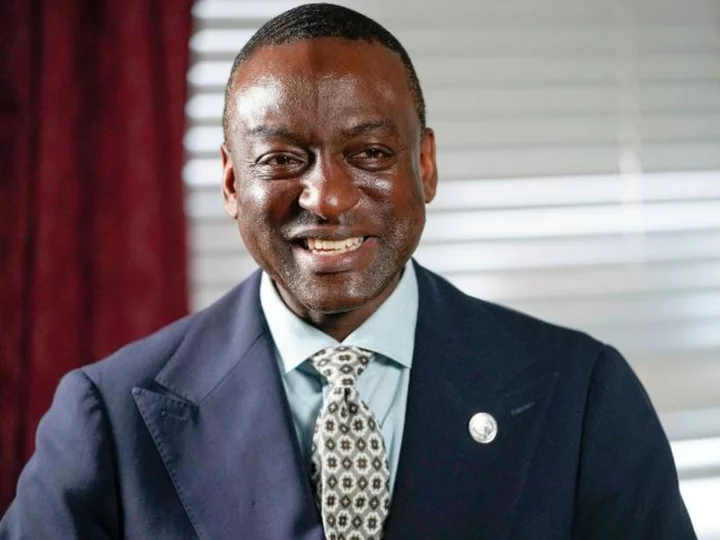
Exonerated Central Park Five member will win primary for NYC council seat in Harlem, CNN projects
Yusef Salaam, an exonerated member of the Central Park Five has won the Democratic primary for a New York City Council seat in Harlem, CNN projects, after a reallocation of ranked-choice voting results expanded Salaam's lead.
2023-07-06 23:47

Democratic lawmakers demand Pentagon disclose findings of investigation into drone strike that may have killed civilian
Democratic lawmakers are demanding that the Pentagon disclose the findings of its ongoing investigation into a US airstrike in Syria in May that may have killed a civilian, according to a letter Democratic Senators Elizabeth Warren and Chris van Hollen and Democratic Rep. Sara Jacobs sent to Secretary of Defense Lloyd Austin on Thursday.
2023-07-06 23:46
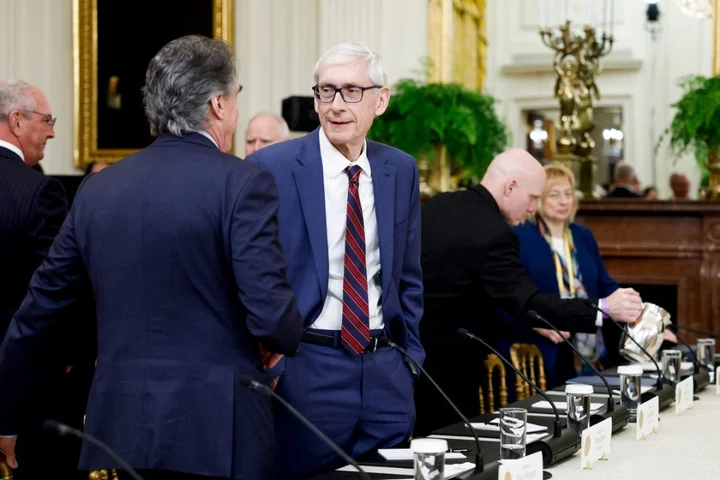
Wisconsin governor seals 400 years of public school funding increases with budget veto
Wisconsin Gov Tony Evers, a Democrat, used his line-item veto power to enact a state budget that increases spending for public schools for the next 400 years, The Milwaukee Journal Sentinel reported. Mr Evers used the broad powers given to Wisconsin governors to strike a hyphen and the “20” from a reference to the 2024-2025 school year. The line-item veto will make sure that the limits that the state imposes on school districts on how much they are allowed to raise per student will increase by $325 until 2425. The line-item veto will table debates between the two parties during the budget-writing season. Republicans control the state legislature in Wisconsin. Mr Evers said that the move would “provide school districts with predictable long-term increases for the foreseeable future.” Mr Evers also used his line-item veto to nullify much of Republicans’ proposed $3.5m tax cut that would have mostly slashed taxes on the state’s wealthiest residents. But Robin Vos, the speaker of the state House, decried the move. “Legislative Republicans worked tirelessly over the last few months to block Governor Evers’ liberal tax and spending agenda. Unfortunately, because of his powerful veto authority, he reinstated some of it today,” he said in a statement. Dan Rossmiller, who represents the Wisconsin Association of School Boards, said that while the permanent annual funding was “certainly appreciated,” the additional funding could vary depending on the school district and that the rate might not meet or exceed inflation rates in some districts. “I wish the amount would have been higher,” he said. “With inflation at 40-year highs, it's really important to be able to attract and retain teachers and staff, and to be able to pay the increased costs of everything in a school district's budget.” Republicans likely could not override Mr Evers’s action since they lack a veto-proof majority in the state legislature. Read More Watch live: Trump aide Walt Nauta attends court on charges related to classified documents DeSantis doubles down on ‘homophobic’ anti-Trump ad: ‘Totally fair game’
2023-07-06 23:24
